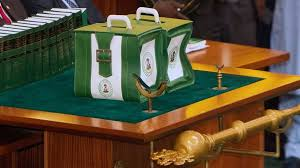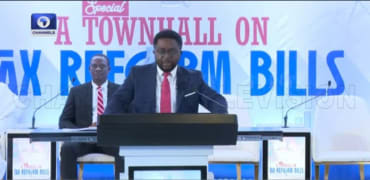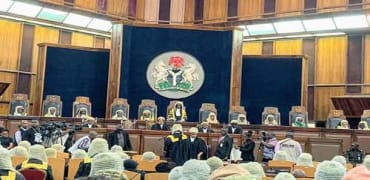2025 Budget Warning : This A Political Document, It Can't Be Implemented
2025 Budget Warning: ‘This is a Political Document, It Can’t Be Implemented’
By Achimi Muktar
“Behind the facts of economics are the facts of psychology… The emotions of fear and confidence, the judgments of doubt and certainty constitute a very important medium through which we see economic values.” – Arthur S. Dewing, Harvard Business Review, 1923.
WHY NIGERIAN BUDGETS OFTEN FAIL
“Whatever a man prays for, he prays for a miracle; every prayer reduces itself to this; Great God, grant that twice two be not four.” – Ivan Turgenev, 1818-1883, Vanguard Book of Quotations, VBQ, p 198.
No federal or, as far as I know, state budget since 1999 has been successfully implemented as written by the president or governors and approved by the lawmakers in Abuja and the states – for one cardinal reason. Almost invariably, they are at best prayers by the Chief Executive Officers (CEOs), rubber-stamped by the legislative branch; and nobody monitors execution from the start to the finish.
Occasionally, the CEO returns to request for supplementary budget approval; receives it without anybody among legislators asking questions about projects slated for the year.
The over 70,000 abandoned projects littering Nigeria, representing monumental waste of public funds, are emblematic of the failure of democracy in Nigeria. Neither the executive nor the legislative branches have served the people well.
Annual budgets often fail because they constitute more of political gamesmanship than economic plans. To begin with, under civilian governments, since 1999, no budget presentation has started with a review of the current year’s performance.
Yet, every adult should know that the present situation is a result of choices made in the past, and it will influence the possibilities available tomorrow. Having failed to deliver on most of their promises, the CEOs ignore the results and present a new year’s budget as if the nation or state is starting on a clean slate without a lot of baggage from the past.
Nobody needs to be an economist to realize that this is self-deception.
RECURRENT FAILURE OF BUDGETS SINCE 1999
Insanity has been defined as doing the same thing over again and expecting a different result.
After Obasanjo’s first two years in office, no Nigerian president should have gotten into the trap of treating the annual budget as a political document instead of a framework for economic development and social advancement.
That sense of responsibility would always dictate that the framers of the budget be as truthful as possible in their projections. Furthermore, they should always admit it when they fail and set about finding out the reasons for failure. The lessons learned would help subsequently to achieve better results.
Two examples of wishful thinking pervading budgeting at the federal level illustrate this point.
Every budget since 2009 had been based on the assumption of 2.3 million barrels per day (mbpd) of crude oil produced and exported.
Yet, records easily available to governments since then would prove beyond reasonable doubt that Nigeria has been producing, for export, approximately 1.4mbpd virtually every year.
The records for 2022, 2023, and now 2024 have not altered the pattern.
Yet, despite the overwhelming evidence, the budget for each year had been based on 2.3mbpd. Consequently, each and every year’s budget was based on a predictable negative dollar revenue variance, which would later result in three other shortfalls. One, lower than expected dollar supply would impact the exchange rate negatively; the naira would depreciate further. Two, the budgeted aggregate deficit would be exceeded. Aggregate revenue would fall below expectations unless the currency is devalued and inflation rate increases.
The Nigerian economy has been suffering from all these budgetary miscalculations for 25 years, and we are about to enter a new year without altering our approach to budgeting.
Who, for instance, believes that the exchange rate will decline to N1400/$ or that inflation will come down to 15.8 percent – when at the end of November, we are experiencing N1690-1740/$ exchange rate and inflation now racing towards 33.50 percent?
Commonsense, which is obviously not common among our political leaders, would indicate that the starting point of a good budget is to ask and answer the following questions: Where were we before? Where do we stand now? How did we get here? Where would the next budget take us as presented? Is this where we should be? If not, what must we do differently to improve performance in the coming year?
WHY NIGERIANS ARE GETTING POORER
The 2023 Budget was the most dishonest in history.
By November 2022, the exchange rate at the parallel market was already close to N700/$.
Nigeria was heading for economic decline when global crude oil prices tumbled from over $120 per barrel during the Yar’Adua/Jonathan administrations.
Our stubborn refusal to diversify the economy, insist on adequate power supply, promote agriculture and agro-allied industries, scrap the unproductive four refineries, and deregulate the petroleum sector – until too late – have left us with a fragile manufacturing sector.
By 2014, crude oil prices had fallen to under $80; by the time Buhari took over in 2015, it was less than $60. Furthermore, production had gone from 1.7mbpd to under 1.5mbpd.
The cumulative impacts of low crude prices and low output led to the recession of 2016; from which the nation has not recovered.
On the contrary, the situation has become worse. President Bola Tinubu might not realize it, but the proposed budget for 2025 indicates that, even at N1400/$, recovery is not in sight; at N1690/$ the expectation drops to $28.40bn.
POPULATION AS A FACTOR IN POVERTY ALLEVIATION
Nigeria is one nation that has defied the Malthusian theory regarding the relationship between population and food production.
Perhaps population decline will come later.
But, working within shouting distance of a Children’s Hospital, one can see that the noticeable decline in food production in the last two years has had no impact on childbirth. All the new baby cots are still occupied – with some sleeping on blankets on the floor.
The outlook gets more depressing if population growth, 6 million additional Nigerians, and higher inflation are factored into the consideration. Population growth will certainly reduce per capita GDP – with grave implications for investments. Nigeria, once regarded as a country with great market potential, is being gradually downgraded.
The 2025 Budget is unlikely to change the outlook.
Furthermore, there is a direct linkage between economic growth, population growth, and poverty levels. Since 2014, Nigeria’s Gross Domestic Product (GDP) has not exceeded its population growth in any year despite budgetary projections.
The 2025 Budget, like all the others before it, assumes 4.6 percent growth for the year.
Given all the obvious in-built negative variances likely to occur in aggregate revenue, exchange rate expectations, debt servicing, and foreign direct investments, among others, few economic and financial analysts believe that the target will be achieved.
This brings us back to Dewing’s observations about “emotions of fear and confidence, the judgments of doubt and certainty.”
For any economy to achieve over 4 percent GDP growth in any year, its manufacturing sector must be convinced by the government.
Right now, Nigeria’s manufacturers remain skeptical. Here is why.
PROSPECTS FOR THE MANUFACTURING SECTOR
“An economy can only be as strong as its manufacturing base” – Akio Morita, Harvard Business Review, May-June, 1992.
While the Minister of Finance and Coordinating Minister, Wale Edun, expectedly claims that the nation’s macroeconomic environment is now stable, the Manufacturers’ Association of Nigeria (MAN) has a different view.
According to Segun Ajayi-Kadir, the Director General of MAN, “It is evident that the expected relief from the negative impacts of the reform is yet to fully kick in. We are already seeing an escalation of those factors as the floating of the exchange rate has not brought the expected stability, petroleum product costs are rising, and inflation remains stubborn despite increasing interest rates.”
Given the divergence of views between the Federal Government and manufacturers, it is obvious that the private sector will act based on its fears and doubts.
Manufacturers have a major reason to be apprehensive.
Unsold finished goods are piling up everywhere. Some companies are sitting on four to six months’ worth of stock with expiry dates drawing near. Manufacturing has crawled almost to a stop.
Many will not start 2025 in a bullish mood. Paradoxically, the increasing price of products reduces aggregate demand; that curtails production and raises the cost of production – leading to another round of price increases.
Coca-Cola, which, in January, retailed for N250, is now N500 or more.
It is not clear if the elasticity of demand will not eventually result in the total collapse of some brands and the companies marketing them.
“You can get in more trouble with good ideas than bad ones; it is so much easier to push a good idea to excess” – Ben Graham, VBQ p 97.
Two good ideas got us into more trouble than before – fuel subsidy removal and floating exchange rates. Tinubu committed a great blunder by acting too prematurely on the two issues.
Because, in every corrupt country, any attempt to wipe out corruption is an affront to those who benefit from the corruption, the new president should have first investigated and found out who were the beneficiaries of fuel subsidy payments as well as favorable exchange rate allocations from the Central Bank of Nigeria; and how much each of the economic parasites had swallowed.
Then, he would have known those likely to sabotage his reform.





















